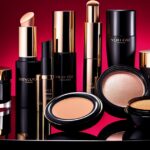Do you want your private label skincare brand to shine in a saturated cosmetics industry? Are you looking to make a splash in the market with your product launches of cosmetics products? Stand out from other store brands and make a name for yourself in the competitive cosmetics industry. Are you eager to attract customers and boost sales?
Effective marketing is crucial for any private label skincare brand looking to make a mark in the cosmetics products industry. This includes strategic product launches, strong branding, and careful product positioning. In a crowded market, a strong branding and product positioning strategy is essential to stand out from the competition. This is especially true in the private label skincare industry, where countless brands are vying for attention. We’ll show you how to captivate your target audience through compelling product descriptions, customer testimonials, reviews, and incorporate them into your content marketing plan and private label skincare marketing strategy for your private label products. This will help enhance your branding efforts.
Developing a comprehensive marketing plan is key to achieving long-term success in product positioning and campaign for a company. Fulfillment is an essential aspect of this plan. We’ll guide you through the key elements that should be considered when crafting your private label skincare marketing strategy, from creating impactful product launches to building a strong online presence for your private label products.
Ready to take your private label skincare brand to new heights with top cosmetics brands, a unique logo, and reliable suppliers?
Identifying Profitable Products for Private Label Cosmetics
To successfully market your private label cosmetics line to shoppers, it is crucial for brands and retailers to identify profitable products that will resonate with your target audience. This will help in creating an effective campaign. Conducting thorough market research is the first step in developing a successful private label skincare marketing strategy for retailers in the trade. By analyzing consumer trends and demands in the crowded market, retailers can determine potential bestselling private label skincare products that will drive sales and generate revenue in the cosmetics industry.
One key aspect of market research is understanding the current landscape of the cosmetics industry, specifically in relation to private label skincare marketing strategy, retailers, private label products, and suppliers. Look at the latest beauty trends and popular product categories in the cosmetics industry to gain insights into what consumers are seeking for their private label skincare marketing strategy. In a crowded market, it is important to stay updated on the latest trends and popular product categories to effectively position your private label products. This information can guide you in selecting private label skincare products that have a higher chance of success in the crowded market. It is important to carefully choose private label brands and suppliers as part of your private label skincare marketing strategy.
Consider factors like quality, uniqueness, and target audience preferences when choosing which products from different brands and suppliers to include in your private label cosmetics line. Quality private label brands products from reliable suppliers are essential for building a reputable brand and ensuring customer satisfaction in the cosmetics and skincare industry. Implementing an effective private label skincare marketing strategy is also crucial for success. Look for suppliers or manufacturers who offer high-quality ingredients and formulations for private label skincare marketing and private label cosmetics. Private label products and private label brands are gaining popularity in the industry.
Uniqueness is another important factor to consider. With so many cosmetics brands on the market, it’s crucial for private label skincare marketing to offer something different and stand out from the competition. Private label products from reliable suppliers can help achieve this. Identify gaps in the market or areas where existing private label skincare products from suppliers can be improved upon to create a unique selling proposition for your brand in the cosmetics industry.
Understanding your target audience’s preferences is vital for selecting the right private label skincare products from suppliers. This knowledge will help brands in their marketing efforts and ensure that they offer cosmetics that cater to their customers’ needs. Consider the age group, lifestyle, skin type, and specific needs when curating your product line of private label cosmetics. Take into account the preferences of your target audience and choose the right brands and suppliers for your private label products. For example, if you’re targeting younger consumers who are passionate about cosmetics and private label products, you might want to focus on eco-friendly packaging or vegan formulas from popular brands.
When evaluating potential products for your private label cosmetics line, keep profit margins in mind. While it’s important to provide value to customers, you also need to ensure that your business remains profitable. This is especially true when it comes to private label products, such as cosmetics. Calculate costs such as manufacturing, packaging, marketing expenses, and any other overheads associated with each private label cosmetics product.
Here are some additional tips for identifying profitable products:
- Stay updated on industry news and emerging trends.
- Monitor social media platforms and beauty influencers for insights into consumer preferences in the cosmetics industry. Stay up-to-date with the latest trends and preferences for private label products.
- Conduct surveys or gather feedback from potential customers to understand their needs and desires for private label products, specifically cosmetics.
- Look for opportunities to collaborate with other cosmetics brands or influencers to expand your reach and promote your private label products.
By conducting thorough market research, analyzing consumer trends, considering product quality and uniqueness, and understanding your target audience’s preferences, you can identify profitable products for your private label cosmetics line. Remember that the cosmetics industry, including private label products, is constantly evolving, so it’s essential to stay agile and adapt to changing consumer demands.
Choosing the Right Market for Your Private Label Skincare Brand
To successfully market your private label cosmetics, it’s crucial to choose the right market for your brand. Evaluating different markets and niches will help you find the most suitable one for your private label cosmetic products that aligns with your target audience and customer base. Here are some key factors to consider when selecting a market for private label products, especially in the cosmetics industry.
Evaluate Different Markets and Niches
Start by conducting thorough market analysis to identify potential markets for your private label skincare brand in the cosmetics industry. Look for segments that have a demand for cosmetics and skincare products and show growth potential. Consider factors such as consumer preferences in cosmetics, market trends for private label products, and emerging needs within each niche.
Identify Target Demographics and Their Specific Needs
Once you’ve identified potential markets for private label cosmetic products, delve deeper into understanding the target demographics within those segments. Determine their specific needs, preferences, and pain points related to private label skincare products. This information will help you tailor your private label product offerings and marketing strategies accordingly.
Assess Competition Levels and Market Saturation
Before entering a particular market, assess the competition levels and market saturation in that segment. A crowded market may make it challenging to stand out from competitors unless you bring something unique or innovative to the table. Consider if there is room for your brand to thrive amidst existing players.
Seek Opportunities with Retailers
Explore opportunities to collaborate with retailers who cater to your target audience. Partnering with established retailers can provide exposure and access to a wider customer base. Research potential retail partners who align with your brand values and have a strong presence in your chosen market.
Attend Trade Shows and Connect with Suppliers
Attending trade shows relevant to the beauty industry can be an excellent way to connect with suppliers who specialize in private label cosmetics. These suppliers can offer valuable insights into different markets, share industry trends, and provide guidance on product development based on consumer demands.
Choosing the right market for your private label skincare brand requires careful consideration of various factors such as target demographics, competition levels, and opportunities with retailers. By conducting thorough market research and analysis, you can position your brand for success in a competitive industry.
Crafting a Unique Brand Identity and Product Positioning
To successfully market your private label cosmetics, it’s crucial to craft a unique brand identity and establish effective product positioning. This will help you stand out from the competition and attract your target audience. Here are some strategies for achieving this:
Develop a strong brand identity that resonates with your target audience.
Creating a strong brand identity is essential for building customer loyalty and recognition. Start by clearly defining your brand values, mission, and vision. Understand who your target audience is and what they value in skincare products. This will allow you to tailor your branding efforts to resonate with their needs and preferences.
- Conduct market research to gain insights into consumer behavior.
- Create buyer personas to understand your target audience better.
- Use these insights to develop a unique brand personality that aligns with their desires.
Clearly define your unique selling proposition (USP) to differentiate from competitors.
Your USP sets you apart from other brands in the market. It highlights what makes your products different or better than others available. Take the time to identify what sets you apart and communicate this effectively in all of your marketing messages.
- Identify the key benefits or features of your products that make them stand out.
- Highlight these unique aspects in all of your marketing materials.
- Emphasize how these qualities solve specific problems or meet customer needs.
Position your products as high-quality, innovative solutions that meet customer needs.
Effective product positioning involves showcasing the value and benefits of choosing your private label cosmetics over others on the market. Position yourself as an industry leader by emphasizing quality, innovation, and meeting customer needs effectively.
- Highlight any certifications or quality standards that demonstrate the superiority of your products.
- Showcase any innovative ingredients or formulations used in creating them.
- Create content that educates customers about skincare concerns and how your products address them effectively.
By focusing on these strategies, you can create a compelling brand identity and product positioning that resonates with your target audience. This will help you build brand awareness, attract customers, and foster brand loyalty.
Remember, consistency is key. Ensure that your brand values are reflected in all aspects of your business, including packaging design, website layout, and customer service. By doing so, you’ll create a cohesive and memorable brand experience for your customers.
4 Strategies to Position Your Private Label Brand for Success
To successfully market your private label cosmetics, it’s essential to implement strategies that will help position your brand for success. Here are four key strategies to consider:
Build Brand Credibility by Partnering with Influencers or Industry Experts
One effective way to establish credibility and gain trust in the market is by collaborating with influencers or industry experts. These individuals have a significant following and influence over their audience, making them valuable partners for promoting your private label brand. By associating your products with trusted influencers, you can enhance your brand’s reputation and reach a wider audience.
- Pros:
- Increased visibility and exposure through influencer networks.
- Enhanced credibility and trust among consumers.
- Potential for higher conversion rates due to influencer endorsements.
- Cons:
- Costly collaborations depending on the popularity of the influencer.
- Difficulty in finding the right influencers who align with your brand values.
- Risk of negative associations if an influencer faces controversy.
Leverage Social Media Platforms to Create Engaging Content and Connect with Customers
Social media platforms offer immense opportunities for marketing private label brands. Utilize platforms like Instagram, Facebook, and YouTube to create engaging content that showcases your products’ unique features and benefits. Interact with customers through comments, direct messages, and live streams to build relationships and foster brand loyalty.
- Pros:
- Wide reach potential due to the large user base on social media platforms.
- Cost-effective compared to traditional advertising methods.
- Ability to target specific demographics based on platform algorithms.
- Cons:
- Constant need for fresh content creation can be time-consuming.
- Competition from other brands vying for attention on social media.
- Negative feedback or criticism may be publicly visible.
Offer Exceptional Customer Service to Build Loyalty and Positive Brand Perception
Providing exceptional customer service is crucial for building customer loyalty and maintaining a positive brand perception. Respond promptly to customer inquiries, address concerns, and resolve issues in a timely manner. By going above and beyond to meet customer needs, you can create a strong bond with your audience and encourage repeat purchases.
- Pros:
- Increased customer satisfaction and loyalty.
- Positive word-of-mouth referrals from satisfied customers.
- Opportunity to gather valuable feedback for product improvement.
- Cons:
- Requires dedicated resources to handle customer service inquiries.
- Negative reviews or experiences can impact brand reputation.
- Potential difficulty in meeting high customer expectations consistently.
Implement Pricing Strategies that Reflect the Value of Your Products While Remaining Competitive
Setting the right pricing strategy is essential for positioning your private label brand successfully. Conduct market research to understand competitor pricing while considering the value your products offer. Strive to strike a balance between profitability and affordability, ensuring that customers perceive your products as high-quality and worth their investment.
- Pros:
- Ability to maximize profits by pricing products competitively.
- Opportunity to differentiate from competitors through unique pricing models.
- Flexibility in adjusting prices based on market demand.
- Cons:
- Balancing profitability with affordability can be challenging.
- Price wars with competitors may lead to reduced profit margins.
- Potential resistance from price-sensitive consumers.
By implementing these strategies, you can position your private label cosmetics brand for success in the competitive market. Remember that consistency, creativity, and adaptability are key. Stay tuned for our next section where we will discuss additional strategies for growing your private label business!
Developing a Marketing Strategy for Private Label Skincare
To successfully market your private label skincare products, it’s crucial to develop a robust marketing strategy that aligns with your overall business objectives. By setting clear goals and utilizing various online channels, you can effectively promote your brand and reach your target audience. Measuring campaign performance using analytics tools will allow you to optimize future marketing efforts.
Set Clear Marketing Goals
Before diving into marketing your private label skincare products, it’s important to establish clear goals that are aligned with your overall business objectives. These goals will serve as a roadmap for your marketing strategy and help you stay focused on what you want to achieve.
Some examples of marketing goals for private label skincare could include:
- Increasing brand awareness: This goal focuses on getting more people familiar with your brand and its offerings.
- Driving website traffic: The aim here is to attract more visitors to your website, where they can learn about and purchase your skincare products.
- Boosting sales: This goal revolves around increasing the number of product purchases and generating revenue.
Utilize Various Online Channels
In today’s digital age, leveraging online channels is essential for promoting private label skincare products effectively. Here are some key channels you should consider incorporating into your marketing strategy:
- Search Engine Optimization (SEO): Optimizing your website content with relevant keywords and ensuring it ranks well in search engine results pages can significantly increase organic traffic.
- Email Marketing: Building an email list allows you to engage directly with potential customers by sending newsletters, product updates, promotions, and personalized offers.
- Paid Advertising: Platforms like Google Ads or social media advertising provide opportunities to reach a wider audience through targeted campaigns.
Measure Campaign Performance
Measuring the performance of your marketing campaigns is crucial for understanding what works and what doesn’t. By analyzing data using analytics tools, you can gain valuable insights that will guide future strategies. Key metrics to track include:
- Website traffic: Monitor the number of visitors, page views, and time spent on your website to gauge its effectiveness in attracting and engaging users.
- Conversion rate: Measure how many visitors are converting into customers or taking desired actions such as signing up for newsletters or making purchases.
- Return on Investment (ROI): Analyze the financial impact of your marketing efforts by comparing the revenue generated from your campaigns to the costs incurred.
By regularly monitoring these metrics, you can identify areas for improvement and make data-driven decisions to optimize your marketing strategy.
Selling Private Label Cosmetics in 10 Steps
Establish an E-commerce Platform or Partner with Existing Retailers/Distributors
To successfully market your private label cosmetics, the first step is to establish a strong online presence. This can be done by setting up your own e-commerce platform or partnering with existing retailers and distributors. Having an e-commerce platform allows you to have full control over your brand and sales, while partnering with established retailers can provide wider reach and access to their customer base.
Focus on Creating Compelling Product Descriptions and Visuals
Once you have your platform or retail partnerships in place, the next step is to focus on creating enticing product descriptions and visuals that grab customers’ attention. Your product descriptions should highlight the unique features and benefits of your private label cosmetics, using persuasive language that appeals to potential buyers. High-quality visuals such as professional product photos or videos can significantly enhance the overall appeal of your products.
Implement Effective Packaging and Labeling
Packaging plays a crucial role in attracting customers and conveying the value of your private label cosmetics. Invest in visually appealing packaging designs that align with your brand image and target audience preferences. The packaging should not only be aesthetically pleasing but also functional, ensuring that it protects the product during shipping and storage. Furthermore, well-designed labels should clearly display important information such as ingredients, usage instructions, and branding elements for easy recognition.
Build Brand Awareness through Social Media Marketing
Social media platforms offer immense opportunities for marketing private label cosmetics due to their wide user base and targeted advertising capabilities. Utilize platforms like Instagram, Facebook, TikTok, or YouTube to showcase your products through engaging content such as tutorials, before-and-after transformations, or user-generated content. Regularly interact with followers by responding to comments, conducting giveaways or collaborations with influencers to build brand awareness.
Leverage Influencer Marketing
Influencer marketing has become a powerful tool for promoting products, including private label cosmetics. Collaborating with influencers who align with your brand values and have a strong following can significantly boost your visibility and credibility. These influencers can create content featuring your products, share their experiences, and provide honest reviews to their audience, ultimately driving sales and increasing brand recognition.
Offer Discounts and Promotions
Everyone loves a good deal! Offering discounts and promotions on your private label cosmetics can be an effective way to attract new customers and encourage repeat purchases. Consider running limited-time offers, bundle deals, or loyalty programs to incentivize customers to choose your products over competitors’. Providing free samples or trial sizes can help potential customers experience the quality of your cosmetics firsthand.
Provide Exceptional Customer Service
Delivering exceptional customer service is crucial in building trust and loyalty with your customers. Respond promptly to inquiries or concerns through various channels such as email or social media. Addressing customer feedback in a timely manner shows that you value their opinions and are committed to providing the best experience possible. Positive customer experiences often lead to repeat purchases and word-of-mouth recommendations.
Encourage User-Generated Content
Harness the power of user-generated content by encouraging customers to share their experiences with your private label cosmetics. This can be done through hashtags, contests, or incentives for sharing photos or reviews on social media platforms. User-generated content not only provides social proof but also creates a sense of community around your brand.
Monitor Sales Volume and Customer Feedback
Regularly monitor your sales volume and customer feedback to gain insights into what is working well and areas that may need improvement. Analyze data such as sales trends, customer reviews, or survey responses to identify opportunities for growth or product enhancements. This data-driven approach allows you to make informed decisions about marketing strategies moving forward.
Continuously Innovate and Stay Relevant
The beauty industry is constantly evolving, so it’s essential to stay ahead of the curve by continuously innovating and adapting to changing trends. Keep an eye on emerging ingredients, technologies, or consumer preferences to ensure your private label cosmetics remain relevant and competitive in the market.
Key Takeaways for Marketing Your Private Label Skincare Brand
Congratulations! You’ve reached the end of this blog post, and now you’re armed with valuable insights on marketing your private label skincare brand. By identifying profitable products, choosing the right market, crafting a unique brand identity, and implementing effective marketing strategies, you’re well on your way to success. Remember that building a successful private label brand takes time and effort, but with the right strategies in place, you can stand out from the competition and attract loyal customers.
Now it’s time to put what you’ve learned into action. Start by developing a comprehensive marketing strategy that aligns with your brand’s goals and target audience. Utilize various channels such as social media, influencer partnerships, email marketing, and content creation to reach your potential customers effectively. Engage with your audience regularly and provide them with valuable content that showcases the benefits of your private label skincare products.
FAQs
How do I choose the right market for my private label skincare brand?
To choose the right market for your private label skincare brand, conduct thorough market research. Identify gaps in the market where there is demand but limited competition. Consider factors such as target demographics, consumer preferences, trends, and competitors in each potential market segment.
What are some effective strategies to position my private label brand for success?
Some effective strategies to position your private label brand for success include offering high-quality products at competitive prices, emphasizing unique selling points that differentiate your brand from competitors, leveraging customer testimonials and reviews to build trust and credibility, and creating an engaging online presence through social media platforms.
How can I develop a compelling marketing strategy for my private label skincare products?
To develop a compelling marketing strategy for your private label skincare products:
- Define your target audience
- Set clear marketing goals
- Conduct competitor analysis
- Create a strong brand identity
- Utilize various marketing channels
- Engage with your audience through valuable content
- Monitor and analyze the results to make data-driven decisions.
What are the essential steps to sell private label cosmetics successfully?
The essential steps to sell private label cosmetics successfully include:
- Conducting market research
- Identifying reliable suppliers
- Developing a unique brand identity
- Creating high-quality product packaging and labeling
- Setting competitive pricing strategies
- Implementing effective marketing and promotional campaigns
- Establishing strong distribution channels
- Providing excellent customer service and support.
How can I build a loyal customer base for my private label skincare brand?
To build a loyal customer base for your private label skincare brand, focus on delivering exceptional products and outstanding customer service consistently. Engage with your customers through social media, email marketing, and personalized communication. Offer loyalty programs, exclusive discounts, and incentives that reward repeat purchases and referrals. Encourage customers to leave reviews and testimonials to build trust and credibility in your brand.
Remember, each business is unique, so adapt these strategies to fit your specific needs while keeping your target audience at the forefront of all your efforts.















